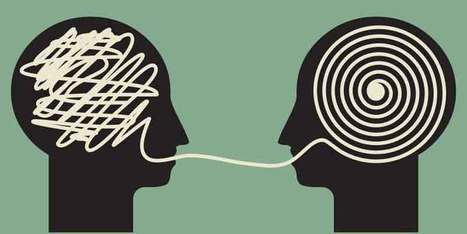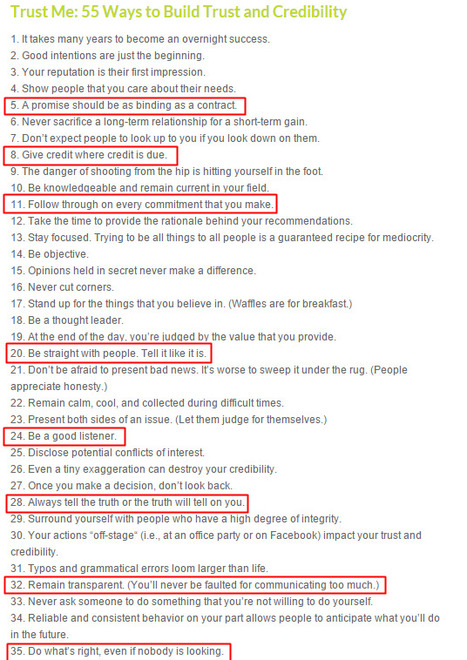In our last blog, we discussed the importance of competence for fostering the trust you need as a manager to influence others.
We stressed that management competence includes not just technical knowledge of the work but operational and political know-how as well.
Here we want to focus on the other great component of trust — character — but by taking a different approach.
So far we've argued that intentions — character — are the foundation of trust, that they must be supported by competence, and that you must take pains to reveal them. But we haven't addressed the question of your intentions themselves. Does it matter what your intentions are?
Yes, of course it does. We don't trust anyone simply because they have clear intentions. Otherwise, we'd trust Hannibal Lector and other villains.
===> People trust us because we have the right intentions, which are those intentions people accept and agree with. What are "the right" intentions? <===
That's not an easy question to answer, especially for a boss, and it's the subject of our next blog.
Read more, very interesting...
Via
Professor Jill Jameson,
Gust MEES



 Your new post is loading...
Your new post is loading...





![How to Build Online Trust [Infographic] | 21st Century Learning and Teaching | Scoop.it](https://img.scoop.it/P4nlDEsx3Mbc93MgZeqeTDl72eJkfbmt4t8yenImKBVvK0kTmF0xjctABnaLJIm9)









Opinions: I think this is the modern generation expression of "yes, I am wrong, I should'nt have done what I did, but (even so you should'nt have done this or said this)/(I did'nt mean it this way or I did'nt want it to happen in this way)...". I feel that this individual is just trying to convey the fact that even though she or he does feel apologetic about what he or she has done, she feels that despite this, her mistakes does not negate the other party's mistake or she/he might have wanted to justify the reasons why she had done the things she had done, to avoid misunderstandingsa about the rationale of her actions. I do not feel that it compounds the problen, in fact I think that it makes a problem simpler, by clearing a misunderstanding. The problem might have been complicated earlier due to the misunderstanding, but once the misunderstanding is cleared, the problem is thus simplified.
Quote from the passage: “Please” and “Thank you.” Today’s economic downturn has spawned more cutthroat behavior with less time for courtesies.
Truth be told, with the same speed at which technology has swept the world, manners have been swept under the proverbial rug. I’m left wondering, is this rudeness the result of today’s angst or a trend of indifference that has evolved over time?
While it doesn’t take much effort to say “please” and “thank you,” some people forgo these pleasantries because they simply don’t know better, while others apparently feel these words are beneath their “pay grade.” How much effort does it take to show some gratitude for a job well done? (It’s not as if you’re being asked to solve world hunger.) The truth is, if you’re too busy to say “please” and “thank you,” don’t be surprised if others are too busy to help you in the future.
Opinions: I think this does not necessarily apply everywhere even though everybody's lifepace has quickened and this could be due to the environment in which one is working at. Also I feel that other than just looking at the surface of these issues, we should look into it and understand why it actually happens.
Firstly, I feel that it depends on the environment and the upbringing of the people. In working environments, where no common spirit are cultivated or not having a feeling of closeness with one colleagues may make certain people feel shy or not be able to relate to the people around them.
For example, if a healthy and a close-knitted working environment is cultivated, where everyone is friendly and close to each other, they will offer help in times of trouble or when one is busy due to the common spirit they share amongst themselves. And thus with this feeling of closeness people will not be as shy, as if they were strangers, to say "please" or "thank you" and the may understand each other better.
Next, a person's upbringing may also impact greatly on how they interact with other people. Regardless of economic downturn, or the quickening of life pace, if a person is not properly taught of basic courtesies and its importance since young, they may not be able to use such words to show gratitude to the people around them instead they may use other ways to thank others or they may not know how to ask a person nicely to do something, and end up commanding them. And yet the other party does not get feel that she or he has been mistreated as the person is asking of a favour without courtesy or that their help for that person had been ignored without understanding that the other party, the one without proper upbringing, had used other ways to thank that person. Thus family upbringing and teachers will have to play a huge role in cultivating a person, to ensure that that individuals will always be courteous no matter what happens, so as to ensure that people of the future generation will be able to interact and understand each other well enough such that everybody will feel respected.
I think this is the modern generation expression of "yes, I am wrong, I should'nt have done what I did, but (even so you should'nt have done this or said this)/(I did'nt mean it this way or I did'nt want it to happen in this way)...". I feel that this individual is just trying to convey the fact that even though she or he does feel apologetic about what he or she has done, she feels that despite this, her mistakes does not negate the other party's mistake or she/he might have wanted to justify the reasons why she had done the things she had done, to avoid misunderstandingsa about the rationale of her actions.
“Please” and “Thank you.” Today’s economic downturn has spawned more cutthroat behavior with less time for courtesies.
Truth be told, with the same speed at which technology has swept the world, manners have been swept under the proverbial rug. I’m left wondering, is this rudeness the result of today’s angst or a trend of indifference that has evolved over time?
While it doesn’t take much effort to say “please” and “thank you,” some people forgo these pleasantries because they simply don’t know better, while others apparently feel these words are beneath their “pay grade.” How much effort does it take to show some gratitude for a job well done? (It’s not as if you’re being asked to solve world hunger.) The truth is, if you’re too busy to say “please” and “thank you,” don’t be surprised if others are too busy to help you in the future.
I think this does not necessarily apply everywhere and I feel that other than just looking at the surface of these issues, we should look into it and understand why it actually happens.
Firstly, I feel that it depends on the environment and the upbringing of the people. In working environments, where no common spirit are cultivated or not having a feeling of closeness with one colleagues may make certain people feel shy or not be able to relate to the people around them
For example, if a healthy and a close-knitted working environment is cultivated, where everyone is friendly and close to each other, they will offer help in times of trouble or when one is busy due to the common spirit there share amongst themselves. And thus with this feeling of closeness people will not be as shy, as if they were strangers, to say "please" or "thank you."
Moreover, a person's upbringing may impact greatly on how they interact with people. Regardless of economic downturn, or the quickening of life pace, if a person is not properly taught of basic courtesies and its importance since young, they may not be able to use such words to show gratitude to the people around them instead they may use other ways to thank others or they may not know how to ask a person nicely to do something, and end up commanding them. And yet the other party does not get feel that she or he has been mistreated as the person is asking of a favour without courtesy or that their help for that person had been ignored without understanding that the other party, the one without proper upbringing, had used other ways to thank that person. Thus family upbringing and teachers will have to play a huge role in cultivating a person, to ensure that that individuals will always be courteous no matter what happens, so as to ensure that people of the future generation will feel respected and not get
hurt.